Hello, I am Ben W.
I participated as a volunteer with „Anemos Ananeosis / Wind of Renewal” in the WELCOMMON Hostel with the support of the „European Solidarity Corps“, for 8 months, from the 20. of October 2020 until the 20. of June 2021. My main tasks were teaching and organising several different workshops and events.
 I was a teacher for German, English, History and Sport. My students were refugees from inside and outside the hostel. In German and English I taught beginners as well as intermediate level students. The language classes were the main part of the classes because speaking a European language is very important for a lot of the refugees.
I was a teacher for German, English, History and Sport. My students were refugees from inside and outside the hostel. In German and English I taught beginners as well as intermediate level students. The language classes were the main part of the classes because speaking a European language is very important for a lot of the refugees.
In the beginning I taught in cooperation of some experienced volunteers, to learn how to prepare and teach a language. After one week, I got my own German and English class. For the preparation I used either some of the lesson plans the previous volunteers shared with us or I used one of the language books in the hostel.
After a time and some experience I created also a folder with a planning for all my lessons, including games, activities and lesson plans. That helped me a lot to organise myself and to create classes that have a following cycle.
In the beginning all the volunteers participated also in further education about pedagogy from a trained teacher. This training helped me a lot to create general structure for the classes independently of the content of the class. To get the students to learn something it was also important to create diversified classes. To reach this aim I integrated also small games and activities in my classes or I let them write small tests to motivate them to learn. In the last 5 minutes of the class I did every time quick feedback rounds how I could improve my teaching skills or the content of the classes. That was important for me because I am not a trained teacher and this helped the students also to express their interests and what they want to learn. So I was every time in close exchange with the students.
My other class was a history class for some of the residents. I created this class because they came to me and asked for this because they wanted to learn something about the history of the countries they will probably live in. Because of this, the content of the class was the history of Europe from the 1789 until now. The topics were the French Revolution, the Industrial Revolution, the First World War, the Second World War and the Cold War. I tried also to combine the history class with some actual, political topics. For example, when we talked about the French Revolution I did also a class about democracy and how it works nowadays.
My third class was a sport class. I created this class because I think that sport can connect people without language from all over the world. It was also a good balance to all the other classes, especially during the Lockdown when the people didn´t move a lot. I tried to create a sport program where every group of age could fit in and where you have fun on the one hand but also have progress on the other hand.
I participated also in an Arabic class for some weeks, where a resident taught the volunteers some basics of Arabic. That was useful for the communication with the other residents but mainly it created an exchange of knowledge. We taught the residents knowledge we have and they taught us knowledge they have. It created also a more relaxing atmosphere between the residents and us volunteers.

For my personal experience I can say, that I learned a lot during my time as a teacher about how to lead a group, how to solve conflicts, how to take care of different personalities and ways of learning in a group, how to organise something completely by myself and how to teach in a proper way. I learned, also, a lot from the students about their lives, their interests and I got very close with some of the students. Finally, I can say that it was a beautiful experience to be a teacher, I had a lot of fun and I take a big amount of new experiences out of this.
I supported also sometimes the receptionists of the hostel in their shifts. I took care of the needs and problems of the residents and learned also a lot of technical stuff about the hostel, like the electricity and water system and about the booking. Through working as a volunteer at the reception, I became also part of the organisation and administration of the hostel and I got a different point of view inside the hostel. I got also a better understanding for the processes in the hostel and I had more tools and knowledge for the organisation of the activities.
Through the 8 months, I organised several different activities and workshops in cooperation with the other volunteers.
In November 2020, I started together with 3 other volunteers to organise a crowdfunding campaign for the hostel. We wrote an article for main page, shot a short movie and uploaded some pictures to give the donators some information about our projects. We also created several sup campaigns in our native languages to get a bigger range of influence. We also started a professional movie project to have a high quality movie about the hostel. We worked several months on this but we had so stop because of technical problems.

 For Christmas 2020 we organised also a small celebration for the kids. We decorated the whole ground floor, bought a Christmas tree and a personal gift for every child in the hostel. Through this, the residents could learn a little bit about the European culture and celebrations.
For Christmas 2020 we organised also a small celebration for the kids. We decorated the whole ground floor, bought a Christmas tree and a personal gift for every child in the hostel. Through this, the residents could learn a little bit about the European culture and celebrations.
For the New Year’s Eve we organised a small party in the hostel. We motivated the residents to cook a regional meal from their home countries and to share it with all the other residents and volunteers.
Through this, we created a cultural exchange of food and we learned a lot about the different ways of cooking and eating all around the world.
Since February of 2021 we cleaned and organised the backyard of the hostel to create there a new space of relaxation and other activities. First we had to organise and move all the things which were in the backyard before and to clean the whole area. We built also some tables for the backyard out of wood and some metal structures which were there before. We painted all the walls with limestone and created also a small garden area with some plants and herbs. For this we recycled old pallets and wood we found in the backyard. In the middle of June we made a dedication celebration in the backyard with games and activities for the children and we ordered pizza for all the residents.
I also organised several cultural trips to the Acropolis or the Acropolis museum to show the residents a little bit of the Greek history and culture.
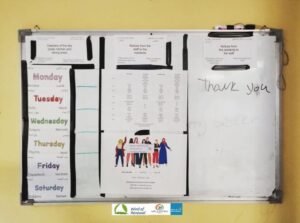 We organised also a cultural exhibition where we created first a workshop. In this workshop the residents could teach their different skills and knowledge they know from their previous education or from their home countries. In the end, we had workshops of sewing, jewellery, hair styling, origami and photography. In a final exhibition we presented the whole hostel all the work and celebrated together.
We organised also a cultural exhibition where we created first a workshop. In this workshop the residents could teach their different skills and knowledge they know from their previous education or from their home countries. In the end, we had workshops of sewing, jewellery, hair styling, origami and photography. In a final exhibition we presented the whole hostel all the work and celebrated together.
In summary, I learned a lot here during my work as a volunteer. I grew up a lot and got a completely new point of view. I learned a lot about the situation of refugees in Greece and about their stories.
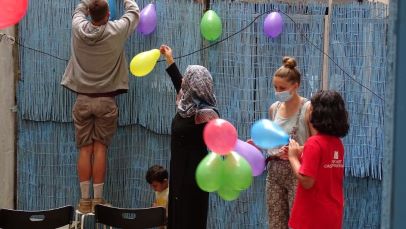
 During these 3 months participating in the European Solidarity Corps project “Green Social Innovation for young persons” implemented by Wind of Renewal, we had time to build things. My daily activities in the hostel were mainly based on kids activities, music classes, cultural and environmental projects with the residents and support the reception.
During these 3 months participating in the European Solidarity Corps project “Green Social Innovation for young persons” implemented by Wind of Renewal, we had time to build things. My daily activities in the hostel were mainly based on kids activities, music classes, cultural and environmental projects with the residents and support the reception.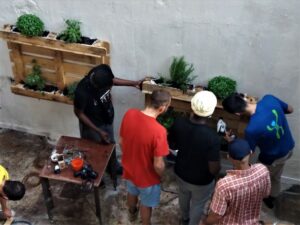 The first project was to rehabilitate the backyard of the hostel. This space was full of materials. We asked some residents to help us empty it and clean in order to use it as a common place for outside classes, and different others events.
The first project was to rehabilitate the backyard of the hostel. This space was full of materials. We asked some residents to help us empty it and clean in order to use it as a common place for outside classes, and different others events.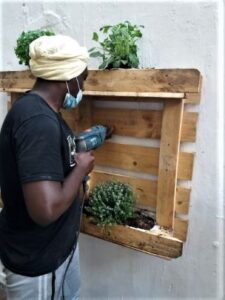 Afterrwards, we organized some decoration workshops with some of the residents focusing on using only natural products and re-using materials. We painted all the walls with the limestone (organic material usually used on the tradditional greek white houses), and built some planters, tables and other furnitures all made of materials that we found in the first place and of palets that we picked up in the streets of Athens.
Afterrwards, we organized some decoration workshops with some of the residents focusing on using only natural products and re-using materials. We painted all the walls with the limestone (organic material usually used on the tradditional greek white houses), and built some planters, tables and other furnitures all made of materials that we found in the first place and of palets that we picked up in the streets of Athens.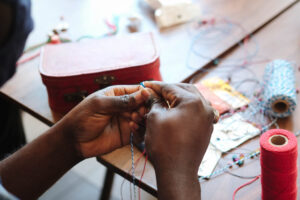
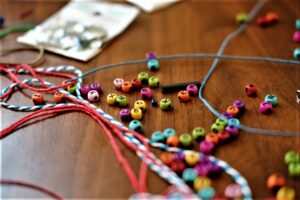
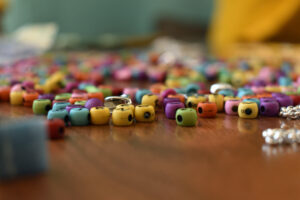
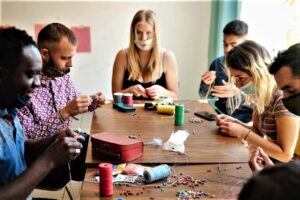
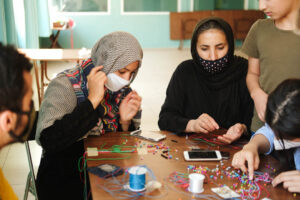
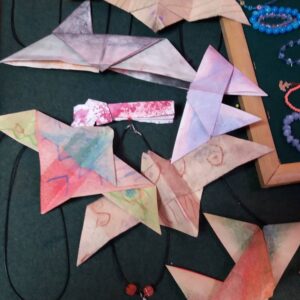
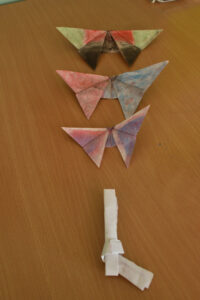
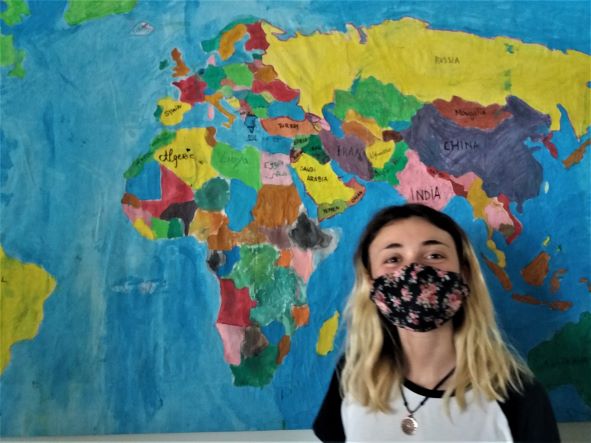
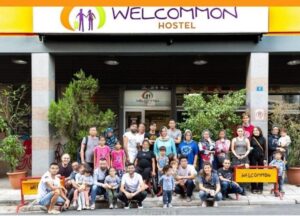
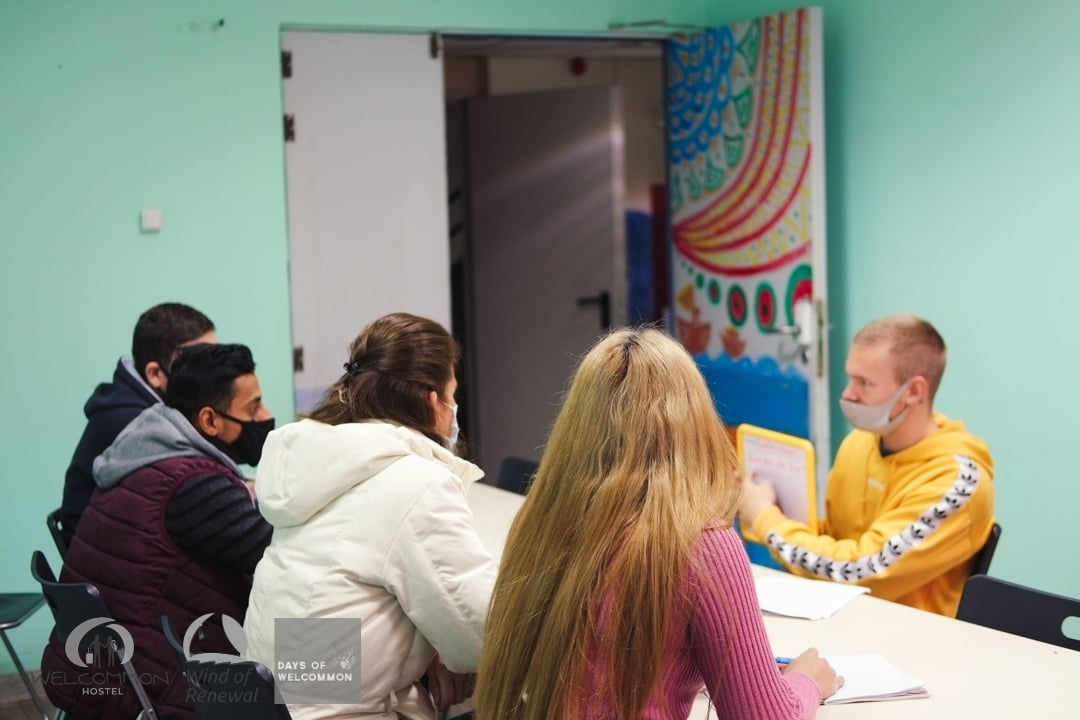
 I was a teacher for German, English, History and Sport. My students were refugees from inside and outside the hostel. In German and English I taught beginners as well as intermediate level students. The language classes were the main part of the classes because speaking a European language is very important for a lot of the refugees.
I was a teacher for German, English, History and Sport. My students were refugees from inside and outside the hostel. In German and English I taught beginners as well as intermediate level students. The language classes were the main part of the classes because speaking a European language is very important for a lot of the refugees. 

 For Christmas 2020 we organised also a small celebration for the kids. We decorated the whole ground floor, bought a Christmas tree and a personal gift for every child in the hostel. Through this, the residents could learn a little bit about the European culture and celebrations.
For Christmas 2020 we organised also a small celebration for the kids. We decorated the whole ground floor, bought a Christmas tree and a personal gift for every child in the hostel. Through this, the residents could learn a little bit about the European culture and celebrations. We organised also a cultural exhibition where we created first a workshop. In this workshop the residents could teach their different skills and knowledge they know from their previous education or from their home countries. In the end, we had workshops of sewing, jewellery, hair styling, origami and photography. In a final exhibition we presented the whole hostel all the work and celebrated together.
We organised also a cultural exhibition where we created first a workshop. In this workshop the residents could teach their different skills and knowledge they know from their previous education or from their home countries. In the end, we had workshops of sewing, jewellery, hair styling, origami and photography. In a final exhibition we presented the whole hostel all the work and celebrated together.
Recent Comments